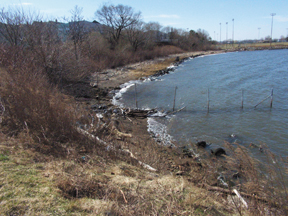After nearly three years trying to put the pieces together, the City of Bayonne is expected to finally create a redevelopment area for a region along Newark Bay between 19th and 21st streets.
“We’ve been trying to get this done for years,” said Council President Vincent Lo Re Jr. during the March 11 council caucus.
“We’ve been trying to get this done for years.” – Council President Vincent Lo Re Jr.
________
A redevelopment zone is a usually blighted area where a city can change the zoning laws, seek out developers, and possibly take over properties by eminent domain.
With input from the city Planning Board, the council has determined that the site meets state requirements to become a redevelopment zone.
How it became the ‘Cove’
The process began in 2006, when John Fussa, Bayonne’s city planner, reported that a number of the properties along the waterfront had been purchased by a single owner who was apparently willing to work with the city toward developing the eye sore.
Called the “Cove Project” as a working title, the properties are known contaminated sites that contain several dilapidated buildings, which could qualify the area under state law as a redevelopment zone. If the study shows the area qualifies, a redevelopment designation would allow a developer to access government resources that would clean up the contamination and redevelop the site and increase the taxable value of the property.
City officials said redevelopment of the site would help to connect the pieces of the public waterfront walkway, continuing the walk from the piers at 16th Street Park to an existing segment recently constructed as part of a townhouse project on the north side of West 21st Street.
The city could also continue the walkway beyond 21st Street to another section already under construction near West 23rd Street and Newark Bay.
Waterfront development is required – under the state permitting process – to provide a public access walkway with each new project.
Paving problems
In other council business, the members discussed this year’s street paving program, an annual spring time ritual to address potholes and street repair. Lo Re questioned why some streets that were recently repaired are beginning to deteriorate again, including JFK Boulevard, which is maintained and repaired by the county.
“Some of these sites have been repaired within the last five years,” Lo Re said.
Councilman John Halecky said the problem does not seem to be exclusive to Bayonne and that he noticed similar problems along Interstate Route 80 up north.
Gary Chmielewski, director of the Department Public Works, Parks and Recreation, said the recent repairs were done with a state-mandated patching material, which differed from materials used in the past.
He said the state apparently was testing out the new materials, an experiment which it has since stopped.
City sued over property maintenance issue
The city’s Law Department put the City Council on notice that Mel Scharf, a local merchant, may sue the city over a recent court action that ordered Scharf’s townhouse at the Boat Works development to be cleared out.
Scharf’s attorney, Ronald Kurzeja, has filed a notice of claim against the city for $30 million for alleged violations of Scharf’s civil rights.
City officials removed as much as $1 million in material from the two floor townhouse earlier this year, claiming the place was unsafely cluttered. City officials said it took 300 man hours to remove the material.
In 2007, Scharf was fined for similar issues at a store that never opened for business.
Council supports state aid for ShopRite expansion
Inserrea ShopRite, which has started its expansion of its Avenue C store this week, has appealed for funding from the New Jersey Economic Development Authority.
Getting City Council approval is one condition for a possible low interest loan from the Local Development Finance Fund, city officials said.
“We want to make sure this project moves forward as quickly as possible,” Lo Re said.
Police cars reviewed
Councilman Anthony Chiappone said he will be looking over a city report on the use of hybrid vehicles as a possible green alternative to supplying new vehicles to the police department. Last month, the city authorized the purchase of five new vehicles rather than the requested 10 in order to determine the viability of introducing more environmentally friendly vehicles.
